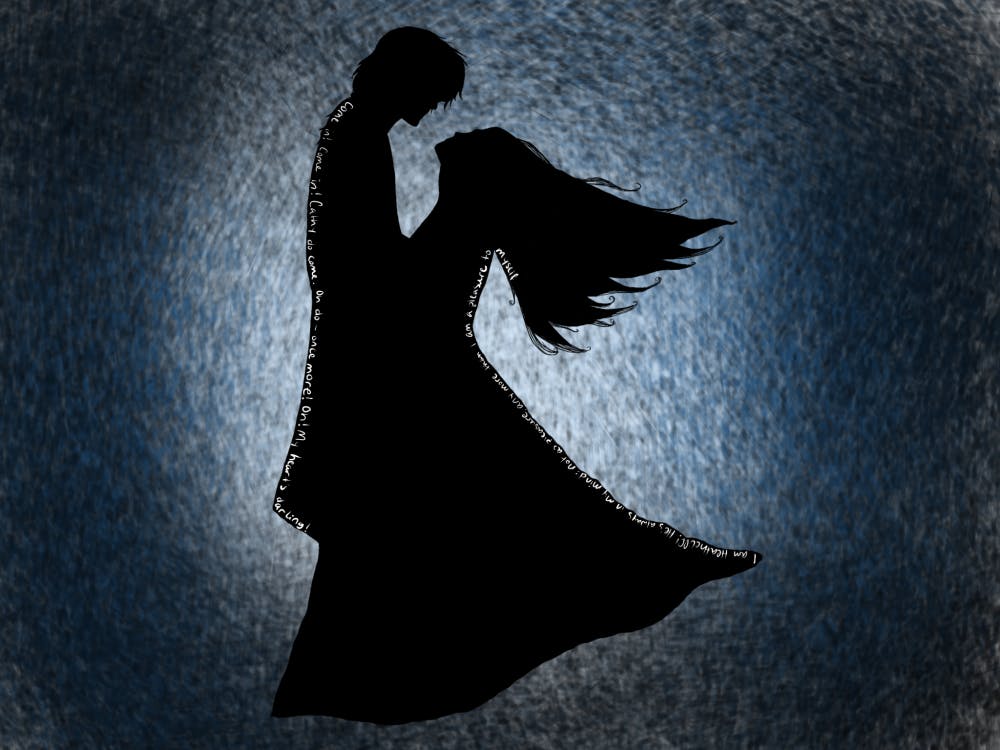Wondering where the archetype of the “bad boy” came from? Look no further than “Wuthering Heights.”
Published in 1847, Emily Brontë’s brooding, gothic masterpiece is the epitome of forbidden love, class difference and soul-rending loss.
Adopted by Mr. Earnshaw, a child named Heathcliff is taken to the Wuthering Heights estate on the English moors, described as “a perfect misanthropist’s Heaven.” The moorland is depicted with stunning loneliness and desolation. It promises the reader a slow descent into solitary madness.
At the Heights, Heathcliff falls in love with Catherine Earnshaw, and the novel flourishes beautifully in this relationship. Both of them view the relationship as something transcending love, as if their lives were entwined in each other’s.
“Whatever our souls are made of, his and mine are the same,” Catherine says at one point. She later explains, “I am Heathcliff! He’s always, always in my mind: not as a pleasure, any more than I am always a pleasure to myself, but as my own being.”
After Mr. Earnshaw’s unexpected death, his son Hindley emotionally abuses Heathcliff. When it’s discovered Catherine won’t marry Heathcliff because of their class differences, and will instead marry a resident at a house near Wuthering Heights, Heathcliff runs away.
When Catherine finds out Heathcliff ran away after he learned they couldn’t marry, she runs into the pouring rain on a black, stormy night, and calls for him:
“She kept wandering to and fro, from the gate to the door, in a state of agitation which permitted no repose...Heedless of my expostulations and the growing thunder, and the great drops that began to splash around her, she remained, calling at intervals, and then listening, and then crying outright.”
Brontë’s gothic portrayal of love isn’t always filled with warmth or selfless affection. Heathcliff’s passion for Catherine becomes, after he returns to the Heights years later, a ferocious obsession and desperate necessity for satisfaction, sometimes pursued with barbaric violence and rage.
The book parallels its intense portrayals of love with a constant state of grotesque hatred. On a night following Heathcliff’s return to the Heights, Edgar Linton grows frustrated of his desire to steal Catherine’s love. He pulls out a pistol with an attached double-edged knife.
“I cannot resist going up with this every night, and trying his door. If once I find it open, he’s done for!”
If the love is obsessive and the hatred malevolent, why read “Wuthering Heights?”
Each character, despite their capability for cruelty, is engulfing. The tale of Catherine and Heathcliff is a stream of stunning beauty. Their passions completely consume the reader and pull every moment of its impressive and complicated structure into a tension-filled current, always hurtling forward.
The bleak, barren setting also secludes the story from any society, making the drama feel as if it’s the only conflict in existence, and that nothing exists outside of the moors.
The history of the novel is also fascinating. Brontë, because of the anti-feminine social customs, had to publish the novel under the male alias, Ellis Bell. For many years, the book was considered offensive for its violent portrayal of Heathcliff, and didn’t achieve critical acclaim until years after Brontë’s death.
Overall, the novel excels in creating a compelling and intense narrative, where the friction and drama is always sprinting towards the next explosive episode in dramatic Gothic style. The themes of love and class difference are smartly acknowledged, and can even be examined as a social commentary.
An early chapter opens on a stormy night after the main events of the story have occurred. After the narrator, Mr. Lockwood supposedly communicates with the ghost of the long dead Catherine, Heathcliff barrels up the stairs, only to learn he has just missed seeing the person he loved to obsession.
He sits at the window sill, calling into the rain and thunder for Catherine to come back to him, making for a moment as beautiful and haunting to the reader as Catherine is for himself:
“‘Come in! come in!’ he sobbed. ‘Cathy, do come. Oh do — once more! Oh! my heart’s darling! Hear me this time, Catherine, at last!’”





